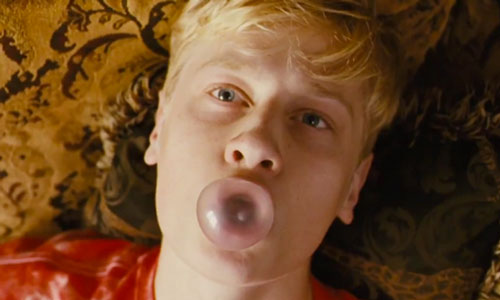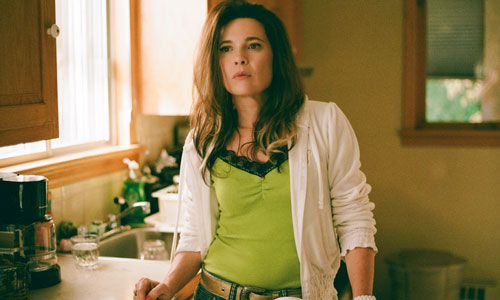Twenty-five-year-old French-Canadian wunderkind Xavier Dolan's masterful Mommy takes the art of filmmaking and to an extreme level that will alter your view on films, and gets my vote as one the best and most powerful films of the year, shining a bright light on humanity.
Its films like Mommy and We Need To Talk about Kevin that allow us to embrace the human condition with all its perfections and imperfections to make the world a more peaceful realm to live in.
"I'm very young, but one thing I've learned is that it is very important in this business never to doubt yourself, although it's just as crucial to doubt your ideas. But in the eyes of others, doubting yourself will make you look weak and won't give you the quality of the leader that you have to be on the set," said Dolan.
"If you are too sure of yourself, too full of yourself so that you never doubt the quality of your own ideas, and what you do, then that is a sign for me of weakness: your ego gets in the way of your storytelling. Believe in yourself, believe in your story, but don't forbid yourself to doubt, because that is a pure lack of intelligence."
Unique approach to storytelling
It's Dolan's unique approach to storytelling that makes Mommy unique. The film's simple story is presented in a series of emotional scenes, filmed with originality and vigour in a unique 1:1 square aspect ratio.
"The perfect square in which it consists framed faces with such simplicity, and seemed like the ideal structure for 'portrait' shots. No distraction, no affectations are possible in such constricted space. The character is our main subject, inescapably at the centre of our attention. Our eyes cannot miss him, says Dolan, who directed his first film at the age of 19 and with Mommy, shared the Cannes Jury prize with Jean-Luc Godard, and Mommy's striking cinematography also earned André Turpin a Bronze Frog at the Camerimage festival last November.
Mommy tells the heartbreaking story of a feisty widowed single mum who finds herself burdened with the full-time custody of her rambunctious 15-year-old son who suffers from ADHD.
It's a gut-wrenching journey with tour de force performances by Anne Dorval as a widow who was born a fighter and had to start anew after her son was placed in a correctional facility; her raging temper, her sexualised gait and manners, her coarse language - which she tries to soften up in order to impress her son - make her a comical, sharp-witted, loud-mouthed being. But beneath the appearances, she's a practically invincible woman, an unstoppable trooper, an unsinkable who'll never take no for an answer.
Sensational as a teenager
Antoine Olivier Pilon is sensational as a teenager whose charm, above all doubts, can be called unique; his - excessive - love for his mother, his resolution to be the man around the house and the way he candidly and irresponsibly wears his heart on his sleeve make him a truly troubling anti-hero.
But his condition, for which he often ends up resenting himself, keeps alienating them, and dispels the faintest notion of coexistence. The frightening reality is that there is nothing he wouldn't do to make his mother happy, unfortunately, nothing.
As mother and son try to make ends meet and struggle with their unpredictable relationship, Kyla, the peculiar, new girl across the street, offers her help, offering them an opportunity to find a new sense of balance, and hope.
Suzanne Cle´ment is equally powerful as a high school teacher on sabbatical who has just moved into town for an indeterminate amount of time.
Any remote sense of dialogue with her husband and her daughter seems impossible, and the days are silent and long. But when Steve and Die makes their entrance in her life - or is it the other way around? - she finds hope again.
But can Kyla abandon her own family for another?
Because while every day spent with Die and Steve seems to take her away from her troubled past, it nonetheless brings her closer and closer to an eventual turn of fate: she could disappear from their lives as swiftly as she arrived in them.
A radiant tale of courage
"To me, it was crucial for Mommy, by all possible means, to be a radiant tale of courage, love and friendship.," says Dolan. "I don't see the point in making films about losers, nor the point in watching them. Which doesn't have anything to do with a contemptuous standpoint towards losers - on the contrary. I just have a particular aversion to any artistic document purporting to portray human beings through their failures. Human beings who, I think, shouldn't be defined by hardships and tags, but by feelings and dreams. Which is why I wanted to make a movie about winners, whatever befalls them in the end. I truly hope I have at least achieved that."
It was important for Dolan for the actors to be at the centre of everything.
"I have an endless fascination for them, and studying the art of acting, investigating all of its forms and styles, analysing its structure, refining it, understanding it is my ultimate goal. Mommy's characters aren't playing games and don't know how to express their feelings with the immodest ease with which many of my previous characters have. Die, Steve and Kyla aren't showoffs. But they are highly boisterous, colourful beings capable of getting their point across in a coherent fashion regarding their respective background and situation.
"I feel like somewhere in time, our love of true, precise characters has withered and been replaced by ready-to-wear roles, to the benefit of whatever efficiency. We confiscate their surnames, their story, theirs tics, their guilty pleasures, their details. We ship actors off in labelled boxes, as long as they fit in the great grid of intelligible, rentable storytelling. But interesting human beings - at least the heroes of my childhood - have always existed in a far more concrete way, and the actors I admire, and with which I love to work, always put the concrete reality they've known and observed forever to the service of a movie. And to me, that's always been what's typical of great actors : they create characters, not performances."
































